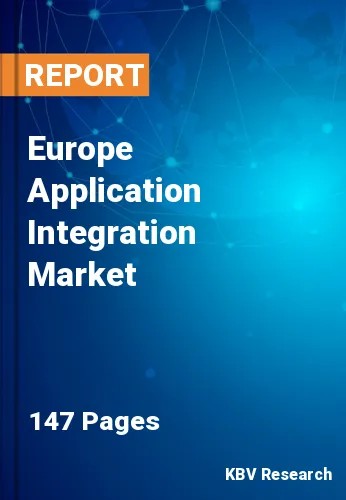The Europe Application Integration Market would witness market growth of 19.2% CAGR during the forecast period (2023-2029).
Companies need to consistently take advantage of emerging technologies to improve agility and speed, like microservices. For deployment, companies also consider alternatives to cloud and edge computing. One can more readily adopt new technologies while gradually transforming the digital business using API-led integration along with event-driven architectures. There are numerous contemporary technologies that can be integrated with on-premise, SaaS, serverless, cloud, and edge device hybrid systems.
The integration technologies best suited for the company will be found by following the needs. For instance, container and serverless technologies accelerate the deployment and scaling of programs to edge devices as well as cloud environments, yet there are numerous serverless and container management implementations offered by companies. When that happens, companies will want to ensure that their integration solution supports the broadest range of DevOps, integration, and deployment technologies to meet specific needs.
The benefits of accelerating digitalization are numerous for society. In order to prepare Europe for the digital era, the EU intends to increase its digital sovereignty by establishing standards. The European Commission unveiled Europe's Digital Decade policy program, which includes specific targets and objectives for 2030 in areas like skills, secure & sustainable digital infrastructures, the digital transformation of businesses, and the digitalization of public services to serve as a roadmap for the EU's digital transformation. A top goal for the EU has been highlighted as influencing Europe's digital future. This is especially evident in the automotive industry, which is shifting from primarily driven by hardware to becoming increasingly driven by (digital) services and software.
The Germany market dominated the Europe Application Integration Market by Country in 2022 and would continue to be a dominant market till 2029; thereby, achieving a market value of $2,906 million by 2029. The UK market is anticipated to grow at a CAGR of 18.2% during (2023 - 2029). Additionally, The France market would exhibit a CAGR of 20.1% during (2023 - 2029).
Based on Integration Type, the market is segmented into Integration Platform as a Service, Enterprise Application Integration, Point-To-Point Integration, Hybrid Integration and Enterprise Service Bus. Based on Application, the market is segmented into Enterprise Resource Planning, Customer Relationship Management, Human Resource Management System, Supply Chain Management & Business Intelligence, and Electronic Health Record Management & Others. Based on Offering, the market is segmented into Platforms and Services. Based on Vertical, the market is segmented into BFSI, Retail & eCommerce, Manufacturing, Healthcare & Life Sciences, Energy & Utilities, Automotive, Transportation & Logistics, Government & Public Sector and Others. Based on countries, the market is segmented into Germany, UK, France, Russia, Spain, Italy, and Rest of Europe.
Free Valuable Insights: The Worldwide Application Integration Market is Projected to reach USD 44.7 Billion by 2029, at a CAGR of 19.9%
The market research report covers the analysis of key stake holders of the market. Key companies profiled in the report include Fujitsu Limited, Hewlett-Packard Enterprise Company, IBM Corporation, Microsoft Corporation, Salesforce, Inc. (MuleSoft), Oracle Corporation, SAP SE, Software AG, Tibco Software, Inc. (Vista Equity Partners) and Itransition Group.
By Integration Type
By Application
By Offering
By Vertical
By Country
Our team of dedicated experts can provide you with attractive expansion opportunities for your business.

